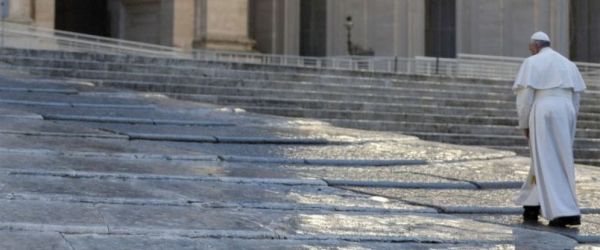With the narrative of the Parable of the Wedding Banquet, in today’s Gospel passage (cf. Mt 22:1-14), Jesus outlines the plan that God envisaged for humanity. The king who “who gave a marriage feast for his son” (v. 2) is the image of the Father who prepared for the entire human family a wonderful celebration of love and communion around his only begotten Son. Twice the king sends his servants to call the invited guests, but they refuse; they do not want to go to the feast because they have other things to think about: fields and business. We often also put our interests and material things ahead of the Lord who calls us — and he calls us to a feast. But the king in the parable does not want the hall to remain empty, because he wants to offer the treasures of his kingdom. So he tells his servants: “Go therefore to the thoroughfares, and invite to the marriage feast as many as you find” (v. 9). This is how God reacts: when he is rejected, rather than giving up, he starts over and asks that all those found at the thoroughfares be called, excluding no one. No one is excluded from the house of God.
The original term that Matthew the Evangelist uses refers to the limits of the roads, or those points at which the city streets end and the paths begin that lead to the area of the countryside, outside the residential area, where life is precarious. It is to this humanity of the thoroughfares that the king in the parable sends his servants, in the certainty of finding people willing to sit at the table. Thus the banquet hall is filled with the “excluded”, those who are “outside”, those who never seemed worthy to partake in a feast, in a wedding banquet. In fact, the master, the king, tells the messengers: “Call everyone, both good and bad. Everyone!”. God even calls those who are bad. “No, I am bad; I have done many [bad things]...”. He calls you: “Come, come, come!”. And Jesus went to lunch with the publicans, who were public sinners; they were the bad ones. God is not afraid of our spirits wounded by many cruelties, because he loves us; he invites us. And the Church is called to reach the daily thoroughfares, that is, the geographic and existential peripheries of humanity, those places on the margins, those situations where the hopeless remnants of humanity camp out and live. It is a matter of not settling for comforts and the customary ways of evangelization and witnessing to charity, but rather of opening the doors of our hearts and our communities to everyone, because the Gospel is not reserved to a select few. Even those on the margins, even those who are rejected and scorned by society, are considered by God to be worthy of his love. He prepares his banquet for everyone: the just and sinners, good and bad, intelligent and uneducated.
Yesterday evening, I was able to make a phone call to an elderly Italian priest, a missionary in Brazil since youth, but always working with the excluded, with the poor. And he lives his old age in peace: he burned up his life with the poor. This is our Mother Church; this is God’s messenger who goes to the crossroads.
However, the Lord places one condition: to wear a wedding garment. Let us return to the parable. When the hall is full, the king arrives and greets the latest guests, but he sees one of them without a wedding garment, that kind of little cape that each guest received as a gift at the entrance. The people went as they were dressed, as they were able to dress; they were not wearing gala attire. But they were given a type of capelet, a gift, at the entrance. That man, having rejected the free gift, excluded himself: thus, the king could do nothing but throw him out. This man accepted the invitation but then decided that it meant nothing to him: he was a self-sufficient person; he had no desire to change or to allow the Lord to change him. The wedding garment — this capelet — symbolizes the mercy that God freely gives us, namely, grace. Without grace we cannot take a step forward in Christian life. Everything is grace. It is not enough to accept the invitation to follow the Lord; one must be open to a journey of conversion, which changes the heart. The garment of mercy, which God offers us unceasingly, is the free gift of his love; it is precisely grace. And it demands to be welcomed with astonishment and joy: “Thank you, Lord, for having given me this gift”.
May Mary Most Holy help us to imitate the servants in the Gospel parable by emerging from our frames of mind and from our narrow views, proclaiming to everyone that the Lord invites us to his banquet, in order to offer us his saving grace, to give us his gift.
[Pope Francis, Angelus 11 October 2020]












